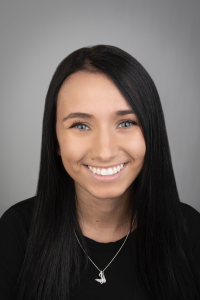 Julia Costa, a recent Merrimack Graduate of the Class of ‘22, rose from an internship to a Full Time Therapeutic Training and Support Staff (TTS) and Therapeutic Mentor at the Justice Resource Institute! Costa graduated with a major in Psychology and a minor in HR Management. Julia also worked at the O’Brien Center, as an FYE Mentor, and interned at the Berwins Counseling Center. Costa was involved on campus as a part of the Dean’s Forum.
Julia Costa, a recent Merrimack Graduate of the Class of ‘22, rose from an internship to a Full Time Therapeutic Training and Support Staff (TTS) and Therapeutic Mentor at the Justice Resource Institute! Costa graduated with a major in Psychology and a minor in HR Management. Julia also worked at the O’Brien Center, as an FYE Mentor, and interned at the Berwins Counseling Center. Costa was involved on campus as a part of the Dean’s Forum.
Congratulations on your new position. Thank you for meeting with me. Can you tell us a little bit about why you chose to work there? What makes this company a great place to work?
I had always thought about working at the Justice Resource Institute! Ever since my internship, I found during my time there that everyone was so kind and helpful! And I fostered great connections with bosses and coworkers, who make work the right amount of fun and serious!
I was lucky to get to know people there even before I started my position. There are great benefits, too! I knew I wanted to do clinical work and help people from a young age. And I knew if I could get a job there with a bachelor’s degree, my experience there would set me up for success when I go get my master’s degree.
How did you find this position, and can you tell us a little bit about what you do there? And is there any advice you’d give to other students looking to break into this company?
I found my internship with JRI on Indeed. It was one of many positions I applied to. The JRI takes people into the community. The goal of this is to work on social skills by taking them to playgrounds and showing them how to introduce themselves. Our aim isn’t perfection, but helping clients feel more confident about what it is they set out to do. We work with them on a yearly basis in the hopes of reaching the goals of the client. For example, if they have self-esteem issues, we would go to the mall, and work on communication with employees.
My role as TTS involves working with a lead clinician, and visiting homes for in-home therapy. We worked on whatever the family needed in terms of their goals. I would say that you should put yourself out there, it may not always be a success, but ask questions, scary to get into it, people will help you, and develop your own style. Never be afraid to ask for help or ask questions.
Can you talk us through the process of finding and applying for your internship?
I went to The O’Brien Center and had my resume looked over by a career advisor. I wrote cover letters and applied to 30 places. I did 5-10 interviews with supervisors and coworkers, with lots of them on zoom. I knew right away I wanted to be at JRI. My advice is to look professional and engaged in the conversation.
How did you prepare for the interview? What was it like, and do you have any tips on interview techniques or questions?
A major tip I would offer is to be yourself, be friendly, and be open to any position they may put you in that’s inside your comfort zone. Some ways I prepared for the interviews was through taking Professional Development and Internship classes. I also did mock interviews, and looked online for commonly asked questions on interviews. If I didn’t have an exact answer, I would work my way through it. Most
importantly though, I made sure to be myself through the whole process.
How did the O’Brien Center help with getting prepared to apply, with the interview or with the job search?
My resume was looked over by a career advisor from the O’Brien Center. I worked there for three years. One of the jobs I did was working on resumes, so I got used to it by my experience working there.
In general, how did Merrimack contribute to your career development? What resources did you use?
I did use the O’Brien Center! Katie Dewey-Rosenfeld, an internship coordinator in the Psych Department, was a huge help. And the classes I took helped with my interview skills. I advise that students take advantage of career fairs, both general and major focused, as those are so important to do. Go to them even if you already think you have a job, as it’s good to see other companies and speak to them.
What surprised you about your internship experience? Were there any situations that came up that you were unprepared for?
My first internship at JRI was less clinical based, but more focused on working with other companies. Another internship I had was more clinical based. That was more difficult at first, since I was interacting with people in crisis. And your first person is always hard and stressful, you have to think on your toes but I was always able to navigate.
What skills have you developed working for this company and what do you wish you had known prior to starting the internship there?
Some of what I learned are documentation skills, writing skills, and learning to schedule around other people. I improved my communication skills with clients of all ages, and increased teamwork skills.
Any campus shout-outs to folks who have helped you along the way in getting you to this point?
The psychology department, the career center, and all my professors and mentors.
Speaking of your time at Merrimack, how did you grow in your time here? Were there any influential clubs, jobs, professors, or moments for you?
I definitely grew as a whole while I was here. Being away from home was challenging, but I made connections and learned about responsibility. My two internships prepared me for where I am now.

